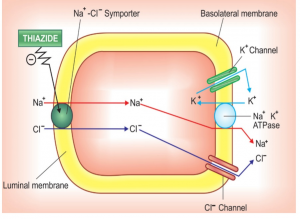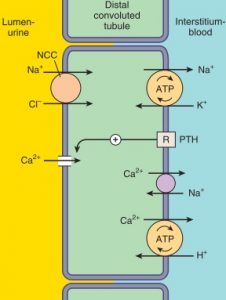Diuretics are the drugs which causes loss of Na and water in urine.
CLASSIFICATION OF DIURETICS
HIGH EFFICACY DIURETICS
SUPHAMOYL DERIVATIVES- furosemide, bumetanide
MEDIUM EFFICACY DIURETICS
THIAZIDES– hydrochlorothiazide, benzthiazide
THIAZIDE LIKE– metolazone, xipamide, indapamide, clopamide
WEAK DIURETICS
CARBONIC ANHYDRASE INHIBITORS– acetazolamide
POTASSIUM SPARING DIURETICS–
- Aldosterone antagonist- spironolactone
- Inhibitors of renal epithelial Na channel- amiloride
OSMOTIC DIURETICS– mannitol
THIAZIDES
All thiazides are secreted by the organic acid secretory system in the PCT and act on the cortical diluting segment (early DCT). They inhibit NaCl symport.
It leads to increase in Na load to distal segment where this extra Na is exchanged with potassium and hydrogen ions leading to hypokalemia and metabolic alkalosis.
It also Increases Ca absorption because lowering of intracellular Na + by thiazide-induced blockade of Na + entry enhances Na + /Ca 2+ exchange in the basolateral membrane.
It’s efficacy is moderate as 90% of glomerular filtrate is already being reabsorbed in proximal segments and therefore it also shows flat dose response curve.
Good oral absorption.
More lipid soluble,more volume of distribution,less clearance, longer acting.
Chlorthiazide is less lipid soluble, less absorbed and only thiazide available for parenteral use.
Edema– for maintenance therapy in mild to moderate cases.
Hypertension– first line drug.
BP=TPR X CO
Thiazides decreases blood volume which leads to decrease in cardiac output which is restored by the compensatory mechanism. Therefore, this only leads to initial fall in BP.
On chronic use, thiazides causes mild hyponatrium which in turn decreases stiffness of blood vessels and thereby decreasing TPR and hence CO.
Nephrogenic Diabetes insipidus– Let us first understand what happens in nephrogenic diabetes insipidus.
Actually, there is excretion of more water than Na concentration of serum
Activation of thirst centre dilution of serum but this free water is not used for excreting solutes as pt.is unable to concentrate urine, cycle repeats.
So, basically thiazides are the only drugs effective in nephrogenic diabetes insipidus by increasing Na excretion more than water and hence breaking the vicious cycle.
Hypercalciuria(renal stones)- as it decreases calcium excretion.





